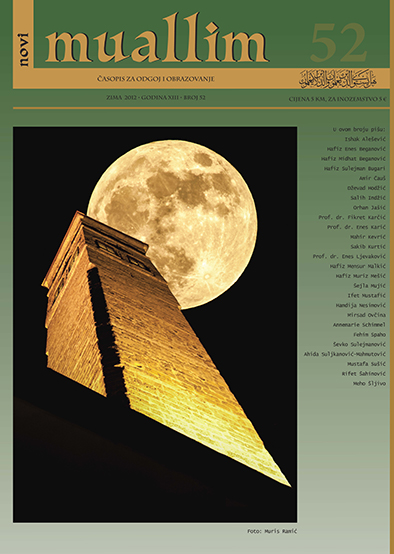DEBATES BETWEEN HUSEIN ĐOZINO AND THE TRADITIONAL ULAMA OF HIS TIME
DOI:
https://doi.org/10.26340/muallim.v13i52.414Keywords:
Islamic thought, fatwas, traditional, modernist, Husein Đozo, intentions, spiritual and intellectual orientationAbstract
The main problem in the way of understanding Islam and the Islamic way of life for centuries was Islamic formalism, because Muslims believe in historical Islam, they are observing the rigid historical forms of Islam. On the bases of such understanding of Islam Đozo had the debates with the traditional ulama of his time. Regardless of the results of the modernist view of Islam, Đozo confronted the opportunists of, not only the background of the official state ideology, but also the members of the traditional ulama, like: Derviš Spahić, muderris of the madrasa in Pojske near Zenica who was a traditionalist with whom Đozo had a debate through the official gazette "Glasnik" , and the debate with Muhamed Pašić that in the most representative way illustrates the two completely different spiritual orientations or the conceptions – traditionalist and modernist. Đozo criticises the traditional ulama such as Sejfudin-ef. Proho for inadequate and incorrect spiritual and intellectual orientation, or Gazali for “strangling the progressive Islamic thought within the rigid form, and for the attempt of giving it a new direction, the direction of mysticism and the stagnation”. Finaly, Đozo will state that the success or the victory of his view he sees in its perspective in the long run, even though the victory of such a view is secured in the very initial stage because, on the other hand the reactionist -consetrvative opinions are dying out on their own anyway along with those who are promoting such views.
Downloads
Published
How to Cite
Issue
Section
License
Naknada:
a. Časopis ne naplaćuje naknadu za obradu članaka (APC) i naknadu za podnošenje članaka.
Autori koji objavljuju u ovom časopisu pristaju na sljedeće uvijete:
- Autori zadržavaju autorska prava i pružaju časopisu pravo prvog objavljivanja, pri čemu će rad jednu godinu po objavljivanju biti podložan licenci Creative Commons imenovanje koja omogućuje drugima da dijele rad uz uvijet navođenja autorstva i izvornog objavljivanja u ovom časopisu.
- Autori mogu izraditi zasebne, ugovorne aranžmane za ne-ekskluzivnu distribuciju rada objavljenog u časopisu (npr. postavljanje u institucionalni repozitorij ili objavljivanje u knjizi), uz navođenje da je rad izvorno objavljen u ovom časopisu.


